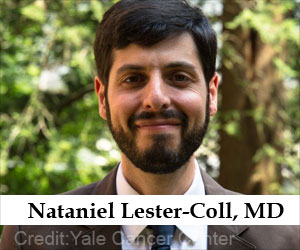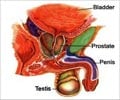Hormone therapy for prostate cancer may up heart-related deaths in men with a prior history of heart disease.
- Prostate cancer is the second most common cancer in men globally
- Androgen hormones in the body cause prostatic cancer cells to multiply, grow and spread.
- Hormone therapy (suppression of androgens) is one of the main treatments for prostate cancer.
- Hormone therapy for prostate cancer is associated with an increased risk of heart-related deaths, especially in men with a prior history of heart attack.
- The risks versus benefits of treatment must be carefully considered before initiating hormone treatment.
Details of The Study
The researchers analyzed data from a decision analysis model that had done a comparison of quality-adjusted life years (QALYs) in men aged 50, 60, and 70 years who were given radiation therapy but no hormone therapy for high-risk prostate cancer and their cardiac risk factors. The research team studied data from a recently published EORTC 22991 trial that assessed men with intermediate-risk prostate cancer randomly chosen to receive either radiation therapy or radiation therapy plus 6 months hormone therapy.Results Of The Study
- Study participants (men) with a prior history of heart attack who received hormone therapy showed a net reduction of 0.3 – 0.4 QALYs. However, hormone therapy improved QALYs (range 0.4 - 2.6) in other men.
- Younger men who had fewer cardiac risk factors demonstrated the highest advantage from hormone therapy.
- Men having low-risk prostate cancer or in other words were at a reduced risk for biochemical (PSA) failure (≤8.7% at 5 years) did not quite benefit from hormone therapy. Furthermore, the beneficial effects of hormone therapy did not begin to show up till more than 7.3 years of follow-up.
About Prostate Cancer
Cancer of the prostate gland usually develops in men older than 65 years. It is the second most common cancer in men worldwide.Initially the disease may not show any symptoms, but larger growths may typically cause urinary symptoms such as
- Urgent need to empty the bladder
- Frequent visits to the toilet
- Straining hard to pass urine, but only a few drops come out.
- A feeling of incomplete emptying of the bladder after passing urine
Prostate cancer is characterized by markedly elevated levels of a protein called prostate specific antigen (PSA) in the blood.
The available main modalities of treatment for prostatic cancer include surgery, radiotherapy and hormone therapy.
More About Hormone Therapy
Prostate cancer grows and spreads under the influence of the male hormone testosterone (androgen). Hormone therapy therefore involves giving drugs to suppress the patient’s androgens, and is termed Androgen Deprivation Therapy (ADT).Choice of whether or not to administer hormone therapy depends on the grade and stage of cancer.
- Erection problems: Common side effect of hormone therapy for prostate cancer
- Hot flashes and sweating
- Loss of interest in sex
- Breast enlargement and tenderness
- Tiredness and fatigue
Lessons To Be Learnt From The Findings of The Study
It is thus evident that men with prostate cancer who already have a history of heart disease are at an increased risk of dying from heart disease related causes following hormone therapy for their cancer.It will be fitting to conclude with the remarks made by one of the researchers of this study - “Patient age, cardiac risk, and disease recurrence risk should be considered when selecting candidates for hormone therapy in this patient [prostate cancer] population,” said Nataniel Lester-Coll, MD, first author on the study and a Resident in the Department of Therapeutic Radiology at Yale School of Medicine. “Men with a history of heart attack who are at very low-risk for biochemical failure may [actually] be harmed by the addition of hormone therapy.”

Reference:
- Side Effects of Hormone Therapy for Prostate Cancer - (http://www.cancerresearchuk.org/about-cancer/type/prostate-cancer/treatment/hormone/side-effects-of-hormone-therapy-for-prostate-cancer)
















